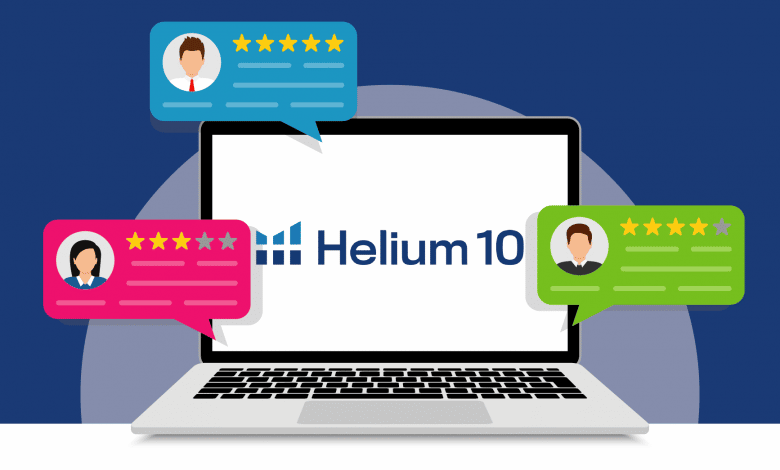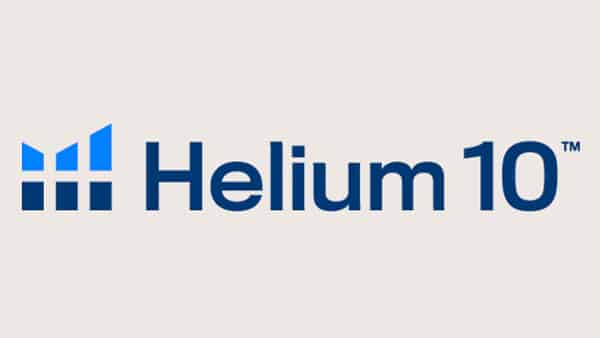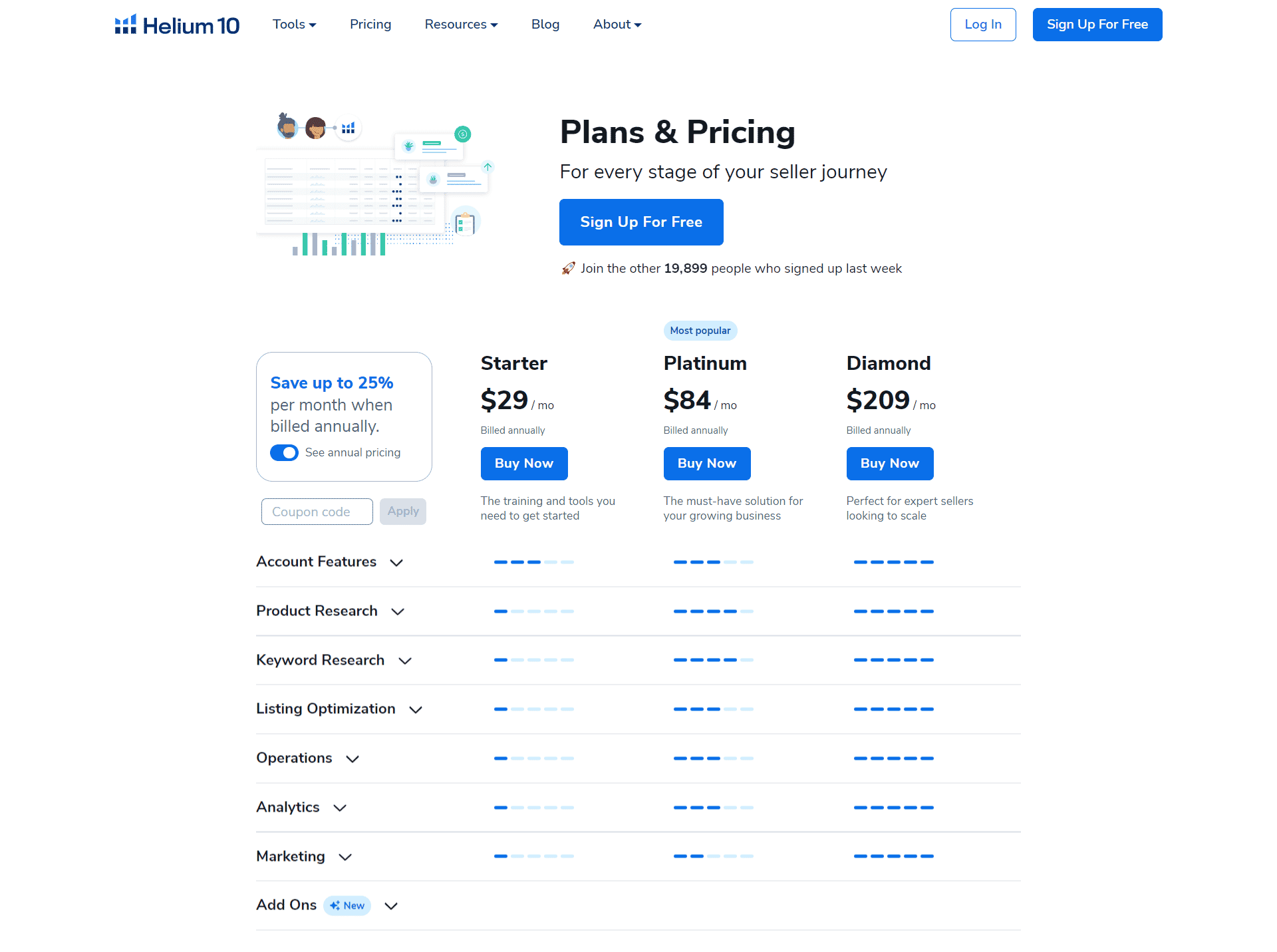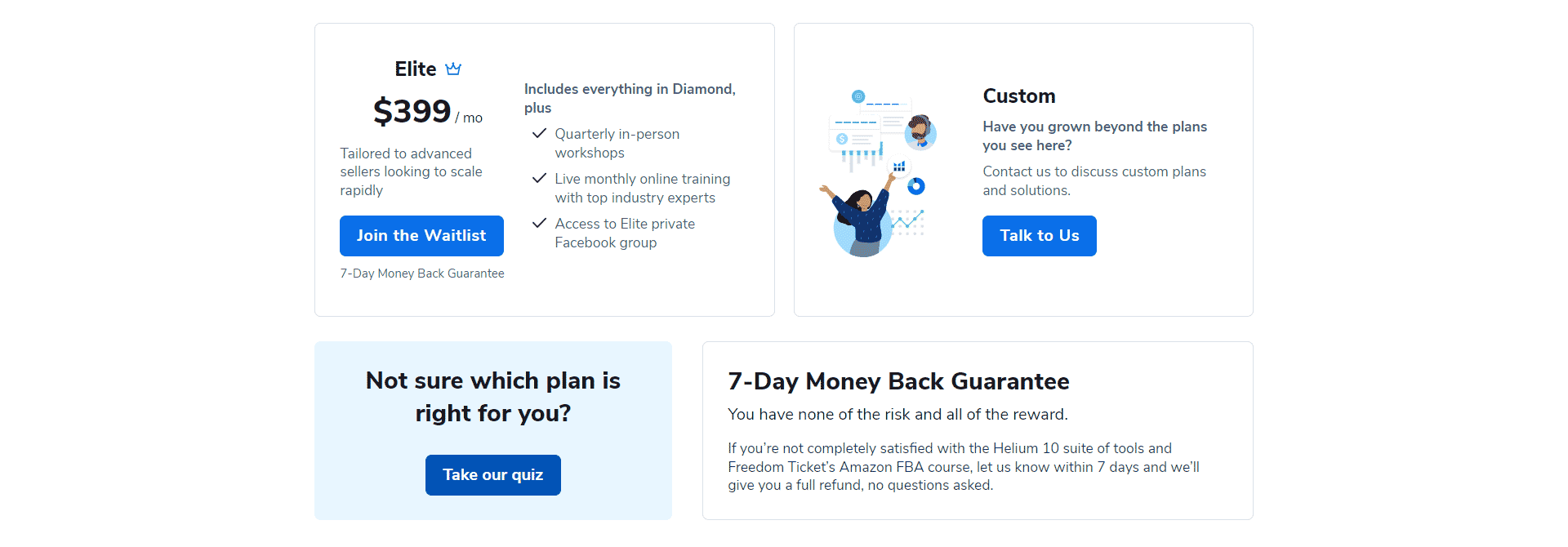Helium 10 Review and Pricing

This article contains affiliate links that will allow us to earn commissions without any extra cost to you. Read our full disclosure here.
Note: This review article is for sellers looking for what the need to know before buying Helium 10. If you’re already signed up and want to learn how to use Helium 10's features effectively, check out our Ultimate Guide on How to Use Helium 10.
There’s no hard-and-fast formula to a successful ecommerce business, but there are things that come close to being indispensable to running a sustainable online brand. One of those is Helium 10.
In this article, we share our own experience using Helium 10 for things like product discovery and keyword optimization, talk about its pricing, and whether it’s suitable for your business.
Related Reading: The Best Amazon Software For Sellers

Contents
What is Helium 10?
Helium 10 falls under a broader category of Software-as-a-Service or SaaS intended to simplify and optimize processes within your ecommerce business. Ask any seasoned Amazon seller and they will tell you that Helium 10 is a must-have because it does a lot of the things you need on at least an average level—in contrast, its competitors are great at particular things, i.e. Sellics may be your best bet for Amazon PPC, while Jungle Scout is great for keyword research.
Helium 10’s key selling point is that it does all that adequately, and it has certain features that make it the everything-in-one choice for Amazon sellers, particularly those who’ve sold upwards of $100k in products. Its feature set includes product research tools, keyword research, marketing and analytics.
Along with a Chrome extension that integrates with Amazon, there are about 19 main features in Helium 10’s toolkit. Here are the main ones:
- Product Discovery and Niche Selection
- Keyword Research and Listing Optimization
- Amazon PPC Management
- Sales Analytics
- Competitor Research
- Amazon Index Monitoring
- Fraud Prevention
- Email Marketing and Automation
- Inventory Protection
- Refund Management
Helium 10 Pros and Cons
The summary below is not exhaustive of all advantages and disadvantages to using Helium 10, but it should paint a clear picture to help you decide whether it fits your current business.
Helium 10 Pros
- Comprehensive feature set covering almost everything you need for an ecommerce business
- Comes with Free and Starter plans for new sellers
- Best when it comes to product discovery and reverse ASIN tools
- Offers easy integration with the Walmart Marketplace
- Responsive customer support, according to many users
Helium 10 Cons
- Its wide feature set may be overwhelming for new sellers
- The Free package is very limited
- A bit pricier for new sellers than Jungle Scout; and lacks a supplier database
- A pretty common tool for product research–products and keywords become quite competitive
As mentioned above, Helium 10’s biggest selling point is the all-in-one feature set, which is quite attractive, especially for sellers who don’t want to juggle between different software (and different subscriptions) for different functionalities. It’s also among the earliest services to integrate seamlessly with the Walmart Marketplace, which as of writing is the second most used marketplace for online sellers next to Amazon.
On the other hand, its wide array of features might be a double-edged sword that can also overwhelm new sellers who are just learning the ropes. Relying solely on Helium 10 for product and keyword research also often means you easily run into tough competition, it being among the most popular tools on the market.
Helium 10 Plans and Pricing
As of 2022, Helium 10 is available in:
- Starter Plan ($24/mo)
- Platinum Plan ($84/mo)
- Diamond Plan ($204/mo)
- Elite Plan ($399/mo)
- Custom Plan
The Starter Plan is perfect if you’re a relatively new seller who’s looking to dip their toes in Helium 10 before fully committing to a pricier package, as it includes most features at a basic level—there’s also a free 30-day trial, but with very limited access to some essential features if you just want to get your feet wet for free. The Platinum plan is more robust, while the Diamond Plan includes the whole enchilada.
For adept sellers, Helium 10 also offers an Elite Plan for a whopping $400/month, but with stuff like the Adtomic PPC tool (also available in Diamond), in-person workshops and expert-led training. There is also a Custom Plan where your monthly subscription is based on which features you want to include or exclude in your package.
If you’re unsure exactly how to customize a plan suited to your business, there’s also a short quiz you can take to determine which features you’ll be needing most based on things like how much you’ve already sold and how much you plan to spend on PPC.
For a much better deal, you can use EcomCrew’s special code when you sign up for any Helium 10 plan here (affiliate link).
Helium 10 Alternatives
While strong Helium 10 alternatives is an article for another day, there is relatively strong software that you might want to check out before committing to a Helium 10 plan.
- Viral Launch is an equally robust software that does pretty much what Helium 10 does, except for more advanced ecommerce sellers and those who really dig into advanced features. It is, however, best known for product launches.
- Jungle Scout is perhaps the strongest Helium 10 equivalent on the market. Quite the opposite of Viral Launch, Jungle Scout is the most widely recommended software for beginners, with its cheapest $29/mo plan having basically everything you need to succeed as an Amazon seller. In our in-depth comparison of Jungle Scout vs Helium 10, Jungle Scout finishes ahead when it comes to sales and keyword volume estimates.
- AMZ Scout is also a popular direct competitor to Helium 10, and it offers a set of tools tailored to small to medium Amazon businesses. According to many sellers, its product research module is more robust compared to Helium 10.
- Sellics is also a solid choice for some, as it’s designed to help sellers manage their Amazon FBA businesses more efficiently. The difference lies in that Sellics is more attuned to asset management and business operations, rather than product discovery and growing ecommerce businesses.
- Product Opportunity Explorer, which is Amazon’s in-house product discovery tool is also a reasonable choice particularly for newer sellers, as it is already integrated into Seller Central. Its key selling point is that it uses Amazon’s first-hand marketplace data (ergo, actual keyword data) instead of aggregates and estimates like most third-party software does. On the flip side, access to this product discovery feature was somewhat limited as of writing, and many quirks are yet to be sorted out according to some sellers.
Verdict: Helium 10 is the SaaS-Of-Choice for a Reason
Like earlier mentioned, Helium 10 is not the best at anything, but it offers pretty much everything you need to start and grow an ecommerce business. Even its cheapest package is pretty robust with loads of capabilities. Its ability to offer everything you need on at least an average level makes it a fitting all-in-one choice for most ecommerce sellers. You can check out the Helium 10 website to sign up and start using Helium 10’s features and resources.
Did we miss anything? Leave a comment down below and share your thoughts and questions!







Hi! I can’t find your Helium 10 coupon code, can you please share it?
ecomcrew.com/helium10
Hi! I’d like to know your thoughts on the new tools such as Market Tracker 360 :)
Cheers!
Jordi